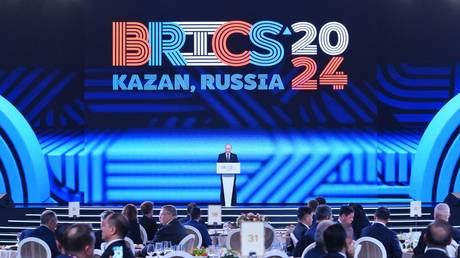BRICS Unveils Manifesto for a New World Order
The document featuring 134 points endorsed by the group’s leaders could have significant implications.

This week’s Kazan Declaration indicates that the BRICS, now with its expanded membership, is poised to embark on a significant new chapter in its evolution. The adoption of such comprehensive documents following the group's summits is unprecedented. The Kazan Declaration is likely to attract considerable attention in political and academic circles globally while also facing critique from BRICS detractors.
For the first time, the document articulates the group’s unified perspective on the current international system in detail.
With 134 paragraphs, the Kazan Declaration represents a substantial increase from the 94 paragraphs of the previous summit's outcome in Johannesburg in August 2023 and the 75 paragraphs from the Beijing meeting in July 2022. This trend of increasing detail reflects the group's growing engagement and the expanding scope of its multilateral cooperation.
The Declaration features a preamble along with four sections that address: strengthening multilateralism, global and regional security, financial and economic cooperation, and humanitarian exchanges. This structure aligns well with the priorities set forth during Russia's chairmanship a year ago.
In this declaration, the group's shared vision of the international system, common approaches to pressing global issues, and their perspectives on regional crises are articulated for the first time. Although it lacks specific timelines or roadmaps for individual initiatives, it outlines key objectives for the coming years. The document is a product of extensive collaboration among experts, officials, and diplomats working within various multilateral frameworks in the months leading up to the summit.
The negotiation process for a document of this scope and significance is a considerable undertaking, especially given that it involved new members unfamiliar with such collaboration. The final 43 pages represent significant effort and complexity.
A review of the declaration reveals a deliberate balance between security and development agendas. This suggests that the group is keen to maintain a broad mandate rather than focusing narrowly on specific initiatives, such as enhancing trade among its members.
Instead of adopting a limited approach, BRICS envisions itself as a multi-functional platform for global governance, where innovative models for addressing major global economic and political challenges can be explored. This “issue-based” approach aims to circumvent departmental divides and mitigate the bureaucratic challenges often seen in international organizations.
Regarding development matters, BRICS is faced with a challenging decision between reforming existing, predominantly Western-oriented institutions or establishing effective alternatives under its unified framework.
The declaration advocates for reforms to existing multilateral structures like the IMF and the IBRD while also supporting the promotion of non-Western alternatives, such as the New Development Bank and the BRICS Contingent Reserve Arrangement. It underlines support for the World Trade Organization as a framework for international economic relations, while also advocating for further trade liberalization among BRICS members.
The document does not specifically critique the trade or financial practices of any nation but voices concern over “unlawful unilateral coercive measures,” such as sanctions that detrimentally impact the global economy and sustainable development. It posits that such measures undermine the UN Charter and multilateral trading systems, reflecting the reality that many BRICS members face unilateral sanctions from Western powers, raising the importance of reducing reliance on traditional international institutions.
Security concerns remain a sensitive topic for many BRICS countries, and the declaration prioritizes this issue. Crafting a consensus-driven document on existing crises and conflicts required significant collaborative effort. Its brief mention of Ukraine refers to previously stated positions taken by the group in UN votes, advocating for conflict resolution through dialogue and diplomacy in alignment with UN principles.
Reaching a consensus on the situation in Gaza likely proved challenging due to differing views amongst member states, such as those of Iran and the UAE. The statement on Syrian territorial integrity may implicitly criticize Turkey’s military presence, which lacks authorization from Damascus. In contrast, there appears to be more agreement on less contentious matters like the nation-building crisis in Haiti and approaches to international terrorism.
The group has opted to further examine more sensitive or complex issues, such as the Russian proposal for BRICS Clear, a platform for trading securities without dollar conversion. Similarly, proposals for advancements in financial systems utilizing blockchain technology and digital tokens backed by national currencies will require deeper exploration at the expert level.
As for improvements to transport and logistics within the BRICS framework, the task's scope has evolved with expansion. However, establishing a BRICS grain exchange may be more feasible given the members' roles as major grain exporters and importers. Increased engagement in global energy markets also seems likely, as BRICS counts among its members many leading producers and consumers of hydrocarbons.
Overall, the Kazan Declaration posits that the expanded BRICS group is prepared to turn a significant page in its history. It is important to note that BRICS does not position itself as an anti-Western alliance nor seeks to intentionally undermine Western institutions. Careful wording throughout the document avoids any suggestion of an inevitable clash between the collective West and the rest of the world.
BRICS does not aim to merely “balance” the West. Given its members' diversity and the lack of a dominant leader, BRICS is unlikely to emulate the G7 framework. Nevertheless, it positions itself to play a prominent role in global governance and to help set the stage for a new world order. The group is asserting its influence among the global South, which has historically lacked representation in multilateral institutions.
The Kazan Declaration is set to capture significant attention in political and academic spheres worldwide, while also facing skepticism. Critics may argue that the declaration lacks focus and specificity, perhaps dismissing it as a mere wish-list. However, it demonstrates BRICS's capacity to reach common ground on a diverse range of topics and signifies its progress as an organization. The upcoming 17th BRICS Summit in Brazil next year promises to be an exciting continuation of this journey from Kazan to Latin America.
This article was first published by the online newspaper Business-Online and was translated and edited by the RTN team.
Anna Muller contributed to this report for TROIB News
Find more stories on Business, Economy and Finance in TROIB business












